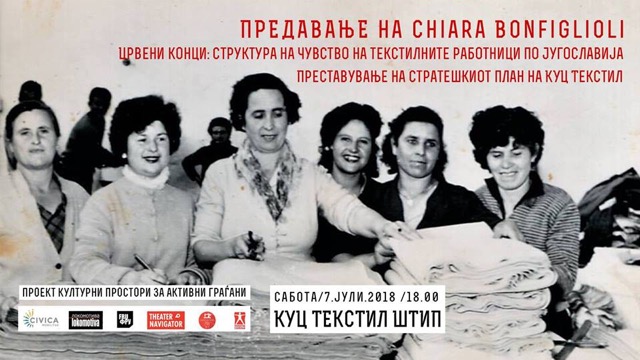On Saturday, July 7, 2018 in KUC TEKSTIL – SHTIP will be organized an event in which the textile workers and the work of KUC Textil from Stip will be discussed.
The event will start at 18:00 in the premises of KUC Textile and will unite 2 segments:
1. Lecture by Chiara Bonfiglioli (Italy) on “Red Strings: Structure of the Feeling of Textile Workers after Yugoslavia” and
2. Presentation of the strategic plan of the KUC Textile made by the association of citizens Glasen Tekstilec from Stip under the mentorship of Ivan Toromanovski. The Strategic Plan will be presented by Christina and Denis Ampevi.
Chiara Bonfiglioli’s abstracts and short biography
Red Strings: Structure of sense of textile workers in Yugoslavia
The emancipation of women through productive labor was a key principle of socialist politics in Yugoslavia after the Second World War. Mass industrialization has contributed for many young women to join traditionally “feminized” sectors, such as textile production.
The production of textile and clothing advanced in late socialism, when the sector covered about 12% of the total production. Local fashion brands such as Varteks, Beko and many others competed in the internal market, while earning their production worldwide.
Textile factories, such as Macedonian and Dalmatian, were also recognized internationally. In order to balance productivity with socialist values, apparel factories have also established a wide range of social assistance rights for their workers (ie canteens, health clinics, resorts, subsidized housing, maternity leave and part-time working for mothers ). This ended after the breakup of Yugoslavia, when the processes of privatization and de-industrialization, together with global changes in clothing production, deeply affected the textile sector. More than 400,000 jobs were lost in the industry, while textile work in new private companies, mainly subcontractors of major Western brands, has become increasingly exploitative and reckless.
In my lecture I explore the gender history of textile work in the post-Yugoslav region, focusing on the experiences of women workers from socialism and post-socialism. Drawing out more than 60 interviews on oral history, as well as official reports, factory newspapers, fashion magazines and visual material, I explore the specific gender “sense structure” (Williams 1978, Byrne 2002; High 2013; Strangleman 2016), developed by textile workers during socialist industrialization and the ways in which it is retained after deindustrialization. I argue, in particular, that the post-socialist nostalgia of the socialist well-being of textile workers is largely shaped by factors such as gender, class and generation, and is widely shared between ethnic and national boundaries. The memories of past social rights are often mobilized as a way to counter the ongoing devaluation of industrial labor and the growing social inequalities characterized by modern post-Yugoslav countries.
The event is organized within the framework of the project “Cultural spaces for active citizens”, programmatically edited by the partners Lokomotiva (Skopje) and Faculty of things that can’t be learned (Bitola / Skopje) in cooperation with “Theater of the Navigator Cvetko “(Skopje) and citizens’ associations Freedom Square (Skopje) and Glasen tekstilec (Stip).
Civic Mobility is a project of the Swiss Agency for Development and Cooperation (SDC), implemented by NIRAS from Denmark, the Macedonian Center for International Cooperation (MCIC) from Macedonia and the Swedish Institute for Public Administration (SIPU) from Sweden.

